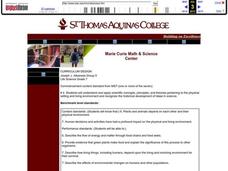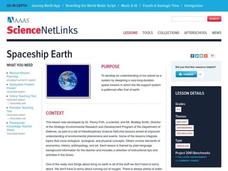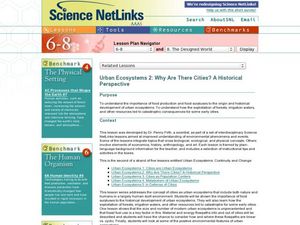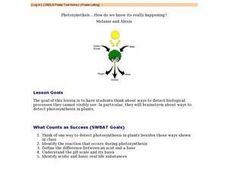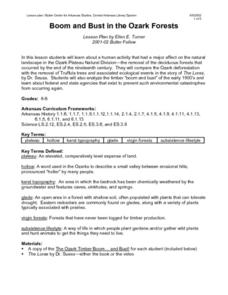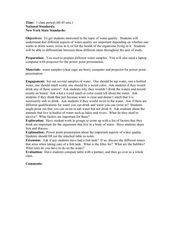Pennsylvania State University
Learn, Protect, and Promote Water
A hands-on activity helps learners explore the water cycle. After discussing how they use water, classes discuss water pollution and then move into a simulation where 20 pupils move through the water cycle based on description cards.
Curated OER
Plants and Animals
Seventh graders discover the interconnectedness of plants and animals in ecosystems. In groups, they create a food web and discuss the problems when one link of the chain is broken. To end the lesson, they set up a balanced environment...
Teach Engineering
Live Like an Animal
When your parents say that your room's a pig sty, tell them about biomimicry. The sixth installment of a nine-part Life Science unit has scholars research the shelters used by animals in the natural world, like turtle shells. Using the...
Maryland Department of Natural Resources
Eyes on Dissolved Oxygen
Learn about the factors that affect the way oxygen dissolves in salt water with a chemistry lab. After studying the molecular structure of water, young scientists figure out how aeration, temperature, and organic waste affect dissolved...
Curated OER
Forest Fun
Learners explore orienteering and how to use a compass. They explore the importance of forests and identify some of the trees in a local forest.
Curated OER
Investigative Case - "Swampeast Missouri"
Students explore wetland hydrology and biology and decide whether or not to restore a wetland or retain dams and drainage systems. They examine the complexity of decisions regarding wetland restoration as well as investigate viewpoints...
CFR Washington
Urbanization and Wildlife
Urbanization and how it affects wildlife is the focus of a presentation that uses statistics to make a case for concern and change.
Curated OER
Spaceship Earth
Students develop an understanding of our planet as a system by designing a very-long-duration space mission in which the life-support system is patterned after that of earth.
Curated OER
Urban Ecosystems 4: Metabolism of Urban Ecosystems
Students discover that material and energy uses by a city come from outside the city boundaries. They realize that the pathway of these material is linear instead of cyclical as they are in natural ecosystems.
Curated OER
Urban Ecosystems 2: Why Are There Cities? A Historical Perspective
Middle schoolers investigate the importance of food surpluses to the historical development of urban ecosystems.
Curated OER
Assessing Risks for Inhalation and Ingestion of Pollutants
Students use a hypothetical scenario to investigate inhalation of an airborne pollutant and ingestion of a waterborne pollutant. They work in pairs, investigating differences in overall exposure to contaminants by calculating inhalation...
Curated OER
Photosynethsis....How do we know it's really happening? - Biology Teaching Thesis
Students think of one way to detect photosynthesis in plants besides those ways shown in class. They identify the reaction that occurs during photosynthesis. Students define the difference between an acid and a base. They identify acidic...
Curated OER
Prairie Scavenger Hunt
Middle schoolers take a close look at the prairie environment. They identify common plants and animals of the prairie. In addition, pupils work in teams in order to put together a presentation on a certain aspect of the prairie...
Curated OER
Spring
Young scholars examine lichens in an outside field trip. Students explore the diversity of this organism and ask questions about them.
Curated OER
Boom and Bust in the Ozark Forests
Here is a hard-hitting, cross-curricular activity on the effects that the deforestation of the Ozark forests in the 19th century had on the people, animals, and ecosystems of the area. The Dr. Seuss book The Lorax is used as a way of...
Curated OER
Solid Waste and Recycling
Students demonstrate effects of waste on environment and ways of reducing it, observe how much packaging goes into bag lunches each day, and survey their families to assess awareness levels and household recycling practices. Lessons all...
Curated OER
The Worldly Philosophers by Robert Louis Heilbroner
CliffsNotes provides a list of study questions to help your high schoolers grapple with The Worldly Philosophers. Some of them are simple and straight forward, while others offer an opportunity to dig in deeper! Consider printing this...
Curated OER
Prokaryotes
They're everywhere! They're everywhere! Prokaryotes cover the Earth! Biology buffs survey the microscopic world of bacteria, including their general structure, metabolism, commercial uses, and diseases caused by pathogenic varieties....
University of Kentucky
Beneficial Bug Scavenger Hunt
Many people think of bugs as annoying pests to be squashed, but most insects and spiders are beneficial, eating the actual pests or pollinating plants. After reviewing some of the common bugs in your area (they may differ from those...
Wild BC
Carbon Sinks and Sources
Earth or environmental science pupils are assigned to be carbon sources or sinks. They ask yes-or-no questions to try to figure out which one they are. Then they discuss ways people can have positive effects on the changing climate by...
Teach Engineering
Designing a Sustainable Guest Village in the Saguaro National Park
Brainstorm ideas to design a sustainable guest village in the Sonoran Desert. The first installment of a nine-part unit teaches young environmental scientists about the basics of the Saguaro National Park and about sustainable design....
LABScI
Population Dynamics: The Predator-Prey Lab
Wolves eat better when the bunny population increases, but how long does that last? A series of 12 biology lessons uses the sixth installment to explore the predator-prey relationship between bunny and wolf populations. Young scientists...
Curated OER
Is Our Water Healthy?
High schoolers test water for a least one chemical characteristic. They hypothesize how a storm event might change the chemical characteristics of a stream. Students collect water samples and use the chemical test to test the water.
Curated OER
Water Quality with Samples
Students recognize whether one wants to drink water, swim in it, or for the health of the organisms living in it. They prepare different water samples to observe and collect samples regarding the water quality.



